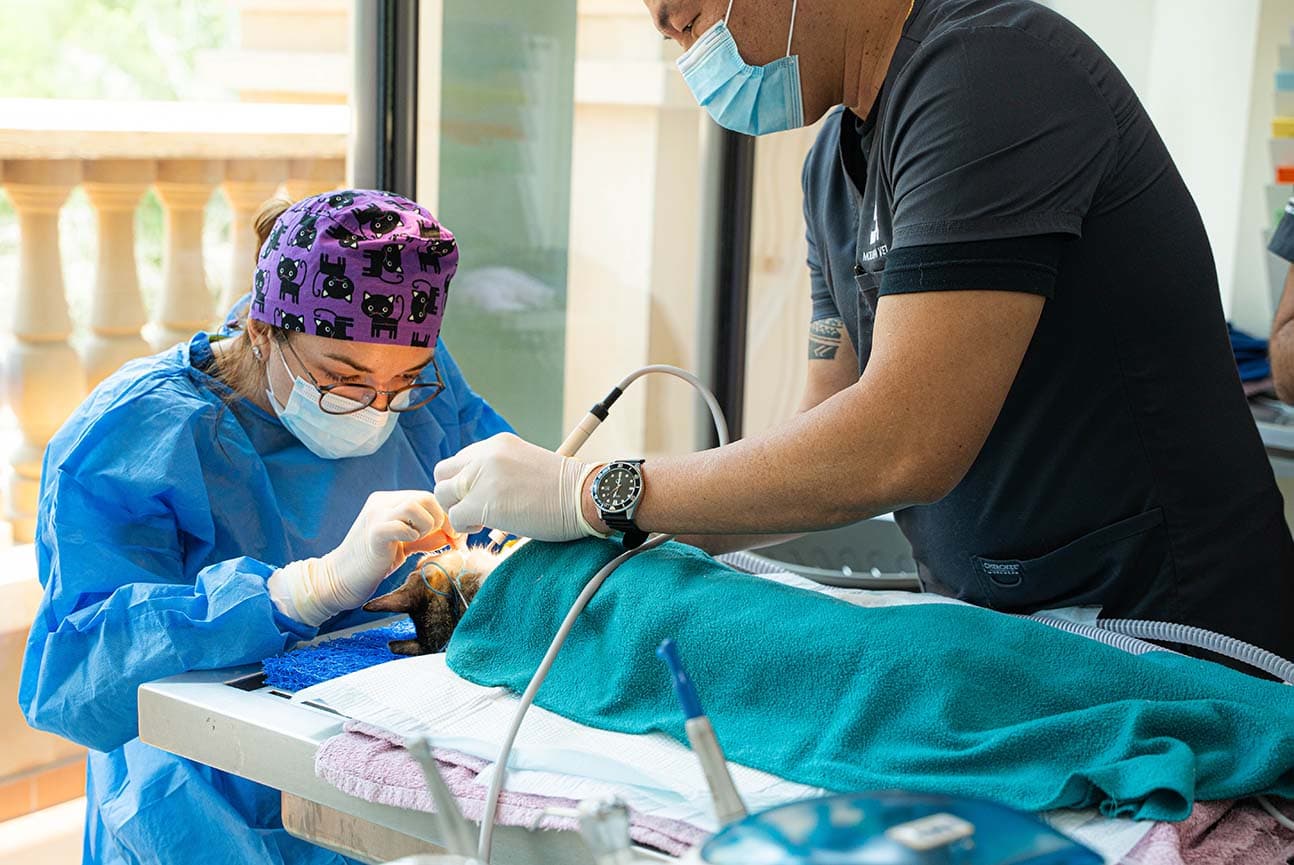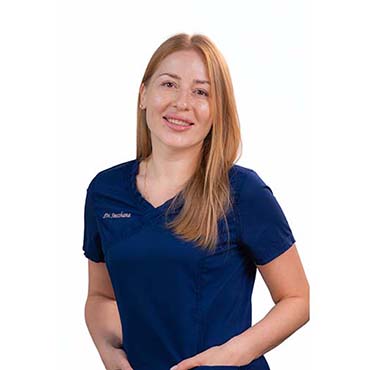Reviewed by Dr. Snezhana Pochkalina
Updated on 03/10/2025
Reading time 4 min.
Overview
Severity: Low
Life stage: All
Periodontal disease is the most common mouth disease in cats, affecting 50 to 90% of cats over four years. In Dubai’s arid climate, this condition can develop faster due to dehydration, which reduces the production of protective saliva. The disease progresses from simple gingivitis to serious periodontitis, causing pain, tooth loss, and potentially life-threatening complications if bacteria enter the bloodstream. Early recognition and treatment are essential for maintaining your cat’s health and comfort.
Overview
Periodontal disease combines two related conditions affecting your cat’s mouth:
- Gingivitis: inflammation and infection of the gums, representing the earliest stage of dental disease
- Periodontitis: advanced disease affecting the tooth ligaments and supporting bone structures
The process begins when bacteria and food particles form a sticky film called plaque on your cat’s teeth. Without regular removal, plaque hardens into tartar (calculus), which accumulates under the gums and triggers inflammation.
Dubai’s dry climate worsens this problem by reducing the production of saliva, your cat’s natural defence against harmful bacteria. Unlike dogs, cats are particularly susceptible to a severe inflammatory condition called stomatitis, which can accompany periodontal disease and requires immediate veterinary attention.
Left untreated, bacterial infection progresses to bone destruction and tooth loss, with potentially serious systemic complications when bacteria enter the bloodstream through inflamed gum tissue.
Symptoms of periodontal disease in cats
Recognising periodontal disease symptoms early helps prevent serious complications.
Visible changes:
- Yellow, brown or grey buildup on teeth: plaque and tartar
- Red, swollen gums: especially on the cheek-facing surfaces
- Bleeding from the gums when your cat is eating or grooming
- Visible loose or missing teeth
Behavioural indicators:
- Persistent bad breath that worsens over time
- Excessive drooling or blood-tinged saliva
- Pawing at the face or mouth area
- Difficulty eating or dropping food whilst chewing
- Consistently eating on one side of the mouth
- Reduced appetite or complete refusal to eat
- Changes in grooming habits or personality
Dubai-specific considerations: Indoor cats in air-conditioned environments may show more pronounced symptoms in dry air-conditioned surroundings. In Dubai, many owners first pick up on persistent bad breath during close contact, since cats spend most of their time indoors to escape the extreme climate.
Risk factors for periodontal disease in cats
Several factors increase your cat’s likelihood of developing periodontal disease.
Age and genetics (inherited factors):
- Cats over four years have an ever-increasing risk and severity
- Older and elderly cats also have a higher risk of other contributory illnesses
- Genetic predisposition varies among individuals
Anatomical factors
- Persian, Himalayan, and other brachycephalic (short-faced) breeds have crowded teeth. These create tight gaps which trap food waste and encourage bacteria.
- Malocclusions (misaligned teeth, improper bite): increase the formation of plaque
Health conditions common in Dubai’s cat population:
- Feline leukaemia virus (FeLV) and feline immunodeficiency virus (FIV)
- Stomatitis: a severe immune reaction causing severe mouth inflammation; requires specialised treatment
- Diabetes
- Kidney disease (common in older cats)
- Eosinophilic granuloma complex
Lifestyle factors:
- Soft food diets: predominant in Dubai households
- Limited access to natural chewing opportunities
- Dehydration from air conditioning and heat
- Stress from indoor confinement may affect immune function
How vets diagnose periodontal disease in cats
Initial assessment:
- Detailed history: discussing any changes you’ve noticed
- Physical examination: including preliminary assessment of your cat’s mouth
Advanced diagnostics under general anaesthetic:
- Dental probing to measure pocket depths around each tooth
- Thorough oral examination: checking all tooth surfaces
- Dental x-rays: looking for hidden damage to roots and supporting bone
- Assessment for other oral health conditions, such as stomatitis
Supporting tests:
- Blood tests: checking kidney and liver function
- Complete blood counts assessing overall health
- Testing for FeLV, FIV and other infectious diseases, which are becoming increasingly common in Dubai’s cat population
Recommended products
Effective dental care products are available through Dubai veterinary practices.
Prescription diets:
- Help cats by reducing plaque and tartar buildup through specially designed kibble texture and ingredients that support oral health.
Home care essentials:
- Veterinary-approved cat toothbrushes and finger brushes
- Enzymatic toothpastes formulated specifically for cats
- Dental wipes for cats refusing traditional brushing
- Antiseptic gels designed for feline oral care
Supplementary products:
- Water additives provide some plaque control
- Dental treats with proven efficacy (monitor calorie content)
- Specialised feeding bowls encourage slower eating
Important safety note: Never use human dental products, as they contain ingredients toxic to cats. Dubai veterinary clinics stock appropriate feline-specific products with guidance on proper selection.
How vets treat periodontal disease in cats
Professional treatment in Dubai follows international veterinary standards.
Cleaning procedure:
- General anaesthesia ensures thorough, stress-free cleaning
- Dental scaling: using a special tool to remove tartar above and below the gumline
- Polishing: smoothing the tooth surfaces to discourage future plaque
- Individual tooth assessment to determine treatment requirements
Advanced treatments:
- Tooth extractions for severely damaged or decayed teeth
- Root canal treatments in appropriate cases
- Specialist referrals: Bone grafting and/or guided tissue regeneration; orthodontics; specific care protocols for stomatitis
Post-procedure care:
- Antibiotics to address bacterial infection
- Anti-inflammatory medications for comfort
- Detailed aftercare instructions
- Home dental hygiene must begin immediately to prevent bacterial recolonisation of teeth
Caring for a cat with periodontal disease at home
Consistent home care is essential for managing periodontal disease.
Brushing techniques:
- Brush your cat’s teeth daily for the best plaque control
- Start gradually using a finger brush, gauze or microfibre swab
- Progress to proper cat toothbrushes as tolerance improves
- Choose cooler evening hours for better compliance
Alternative methods:
- Try dental wipes for cats refusing brushes
- Using a microfibre/gauze swab as a wipe helps remove surface plaque
- Apply special enzymatic gels directly to gums
- Ensure your cat has constant access to fresh water: essential in Dubai’s climate. Water fountains are a good option.
Dietary management:
- Incorporate appropriate dry kibble for mechanical cleaning action
- Ensure adequate hydration to support saliva production: room humidifiers may be beneficial
- Consider prescription dental diets, as recommended by your veterinarian
Tips on preventing periodontal disease in cats
Preventing periodontal disease requires lifelong commitment.
Early intervention:
- Start early: accustom your new kitten to having their mouth examined
- Brush regularly: establish gentle daily routines before problems develop
Diet:
- Feed high-quality complete diets that support oral health
- Consider effective dental treats and toys that encourage chewing action
- Maintain proper hydration levels year-round
Regular professional care and health monitoring:
- Schedule regular veterinary check-ups, including oral health checks, every 6-12 months at least
- Follow veterinary advice for in-patient dental cleaning procedures to protect oral health
- Address dental issues and other health conditions promptly, before they progress
When to worry about periodontal disease in cats
Contact your veterinarian immediately if your cat:
- Is drooling excessively, with blood in it
- Shows no interest in food for more than 24 hours
- Develops obvious facial swelling or asymmetry
- Shows signs of severe pain, including hiding or aggression
- Has difficulty opening or is unable to open their mouth
Schedule an urgent veterinary consultation for:
- Persistent bad breath not responding to home care
- Gradual eating difficulties, favouring one side or dropping food
- Behavioural changes that suggest mouth discomfort
- Visibly loose teeth or gum recession
- Lack of improvement, despite consistent home treatment
Concerned about your cat’s dental health? Dental disease is one of the most common yet preventable issues in felines. At Modern Vet Hospital in Dubai, our expert team provides thorough dental exams, professional cleanings, and personalised care plans to keep your cat’s teeth and gums healthy. Whether it’s routine prevention or advanced treatment, Modern Vet Hospital is your trusted partner for compassionate, comprehensive feline care.
Share this, choose your platform!
Reviewed by
Dr. Snezhana Pochkalina
DVM
Dr. Snezhana was born and raised in a small town called Yelabug in Russia. She comes from a family of veterinarians who also owned a small farm. At 16 years old she graduated from high school and moved to a town called Kazan to continue her education. Dr. Snezhana graduated from the Kazan State Academy of Veterinary Medicine in 2010.


